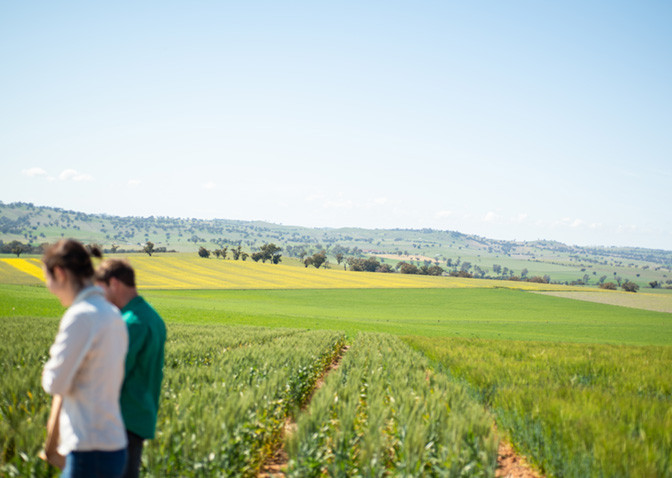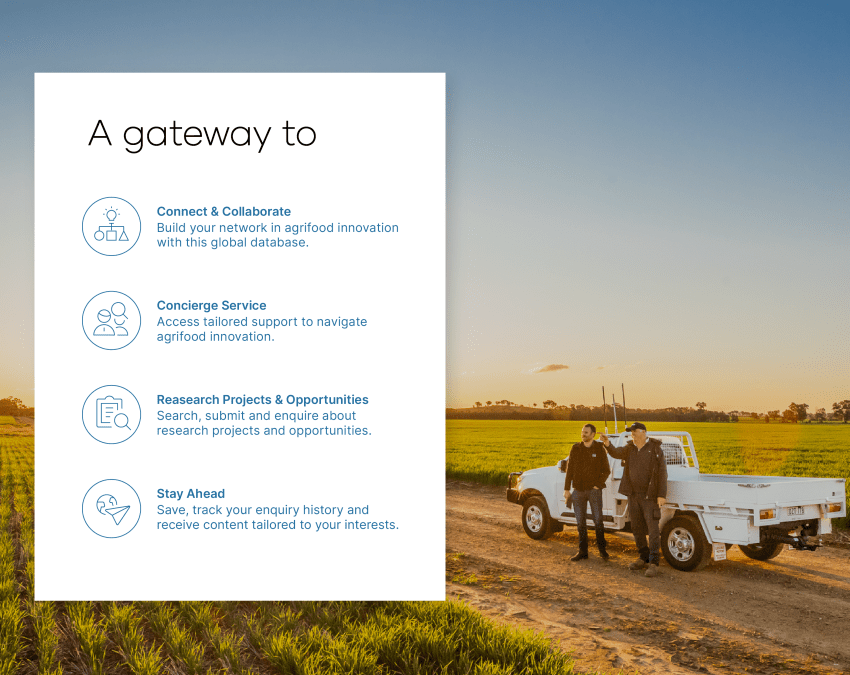
Green opportunity: Asia-Pacific investments geared to tackle climate change
The Asia-Pacific bucks global venture capital decline, with India surpassing China as the powerhouse in the first half of 2022, and farm tech deals doubling in the region. Here Louisa Burwood-Taylor breaks down AgFunder’s 2022 Asia-Pacific AgriFoodTech Investment Report, and Tegan Nock of LoamBio, an Australian microbial tech startup, digs deep into the rich opportunities for farmers to decarbonise our planet.
-2-resized-crop-1185x680.png)
Supercharging our resilience and squashing our environmental footprint has never been more important for the Asia-Pacific. As one of the most vulnerable regions to climate risk, driving change for more sustainable food systems is a top priority, and a focal point for investors.
The AgFunder 2022 Asia-Pacific AgriFoodTech Investment Report, reflects this proactive trend with the region’s agrifood tech startups breaking record funding in 2021, reaching $15.2 billion USD, taking investments to over $55 billion in the past decade.
This record year accounted for 30% of global funding, and a 15% year-on-year increase, with the exception of China, where funding plummeted in the first half of 2022, due to steep regulations throughout the pandemic.
One of the most exciting takeaways, according to AgFunder Head of Media & Research and Chief Editor of AgFunder News, Louisa Burwood-Taylor, “Is that India, for the first time, has overtaken China as the most active and most invested country for agrifoodtech in the Asia-Pacific.”
India raised $2.7 billion in the first half of 2022, surpassing China (not quite meeting $1 billion) as the investment powerhouse, with downstream startups ‘absolutely dominating the marketplace’, such as e-grocery, restaurant delivery and retail technologies, backed by a bustling farm tech ecosystem.
Louisa considers India as a pioneering birthplace of agritech startups, watching the ecosystem blossom over the past decade, noting farm management, software and agribusiness marketplaces as its bread-and-butter. With 450 million smallholder farmers in the region, the potential for positive impact and return on investment is huge.
“I get quite excited about India’s agribusiness marketplaces and technologies that can aggregate farmers together, particularly smallholder farmers who haven't got the access to high-quality inputs, or markets to sell their wares, which will really help them to improve their farming practices, make more money and move beyond subsistence farming,” Louisa explained.
Related organisations

AgFunder Asia-Pacific Agrifood Investment Report 2022
With a storm of variables on our doorstep; food security, climate change, an energy crisis and geopolitical conflict – the task to produce more with less, is front and centre for the Asia-Pacific.
This tumultuous period, during the COVID-19 pandemic, caused valuations to ‘skyrocket’ in 2021, Louisa explained, with some categories peaking and falling significantly, such as alternative proteins. So, she expects a period of normalisation ahead of us.
“It's good that we're having this little pullback because it just means that the most valuable companies doing the best work, are going to continue to succeed, and maybe we’ll have a little less noise around,” said Louisa.
RELATED: $500m raised and counting: Australia’s investment boom in agrifood tech^

Farm tech is one of the standout categories that’s shown positive momentum with deals doubling in 2021, reaching $2.2 billion, scoring a 17.5% uptick and tracking upwards in the first half of 2022, Louisa noted.
Ag biotech startup, LoamBio ranked as the fourth largest Aussie deal in 2021, with its $30.1 million Series A notably the only farm tech deal in the top five.
The microbial seed coating producer, based in Orange, Central West NSW, presents a ‘great enabling technology’, Louisa added for farmers to combat climate risk.
Co-Founder and Chief Product Officer of LoamBio, Tegan Nock explained, “We're creating practical climate solutions for growers to use on-farm to help drive productivity at the same time as delivering sustainability outcomes.”
“LoamBio has developed a microbial inoculum – launching in 2023 – that’s sprayed onto seeds before planting, predominantly broadacre crops, to increase not just the amount of carbon sequestered into the soil, but the stability of that carbon being drawn into and sequestered into our agricultural soils.”
Australian biotech startup, LoamBio’s global impact strategy to decarbonise agriculture
Since LoamBio founded in 2019, previously known as Soil Carbon Co, the startup has expanded to four laboratories, with 70 staff in two continents and trial sites across Australia working with wheat, barley and canola, and North American farming regions working with soy and corn, as first points of product development.
RELATED: Why investing in soil makes good business sense^
Tegan draws upon a rich repertoire of skills, as a farmer and scientist, working with 2,500 unique microorganisms in their library, to find the ‘sweet spot’ of reduced emissions, carbon capture and as a bonus increased on-farm productivity.
“Our focus really sits at that intersection of agriculture, climate and microbial science. So, within that scope we prioritise based on the potential impact of technologies and being able to deliver new modes of action that have global impact and global scale.”
“Right now, we're working towards our product launch for Australia for the 2023 growing season, our final year of pre-commercial trialing in the US, and then stepping into our first year of Canadian trials.”
RELATED: The advanced technology helping viticulture adapt to climate change
Demand for agricultural input alternatives amid global crisis
“Reducing input costs into agriculture has had a renewed level of importance placed on it,” Tegan explained.
“Growing debt and rising inequality are starting to drive some of these investment trends. So having alternatives, to particular inputs that might be based on fossil fuels or have a short-time frame in terms of social licence are key,” said Tegan.
With the biologicals market valued at $11.6billion, and tipped to reach $30billion by 2030, the opportunity is huge. Louisa noted, “There’s been a lot of promise for this category, and unfortunately, we haven’t seen the results, or big adoption on-farm yet.”
“But the tides are starting to turn,” she added. “What’s interesting about LoamBio, is they’re actually sequestering and capturing the carbon with their solution. They’re not saying if you follow a certain practice this is what's going to happen and relying on verifying that with farmers – they're actually building a technology, which is exciting.”
Louisa concluded, “Why would you use a synthetic or chemical product on your farm when you could use a biological one, for the same results, or even better?”
‘Enabling technologies’ to unlock value across the food chain

LoamBio’s differentiating factor is its enabling capability.
“Enabling technologies are really shifting gears in terms of how we look at things like carbon projects. Being able to effectively drive your carbon yield forward puts a greater emphasis and a greater potential on what the economics look like with carbon projects, particularly in the cropping space,” said Tegan.
“Loam's working to provide these types of new technologies to growers, and streamline the way that we deliver those carbon projects to offer a straightforward enterprise level addition to that farm, to diversify income streams and have a genuine income stream coming from that carbon project.”
LoamBio’s pilot carbon project with Shopify, that kicked off in 2021, is a great example – designed to verify high-quality carbon and duly reward growers, by applying LoamBio’s inoculum, and using globally recognised carbon methodologies.
“We’re not only measuring organic carbon overall, we’re also looking at the minerals associated and aggregate carbon, which have longer residence time within soils. This then allows us to go out into the marketplace and build certainty in the type of carbon coming from agricultural offsets,” said Tegan.
“Ultimately those growers are getting paid and credited for the carbon that they're building with additional recognition using our microbial tools.”
Louisa added, “Enabling technologies may not be as sexy as other categories but there’s a lot more innovation needed here in the ‘midstream’ category.”
“We’re going to see more interesting tools that can help, like fermenting as a service or an online platform to help find infrastructure and biomanufacturing capabilities. And it could be really interesting for entrepreneurs to get involved,” said Louisa.
Food security: New horizons for Australian investment
-crop-672x478.jpg)
The vast Australian landscape presents an opportunity for startups, Louisa believes, to explore alternative food manufacturing sources, and scale up infrastructure.
“Australia is a big meat supplier to the world. There’s no reason why Australia couldn't be a big alternative meat supplier.”
Despite the category’s global investment dip in 2021, Australia is attracting local and international investors. Australia’s leading plant-based meat company, v2foods scored a $52.9million Series A deal, ranked the second largest deal in the country in 2021. Cultured meat company, Vow Foods’ $49.2m Series A deal followed in November 2022, paired with the opening of its Sydney manufacturing plant – the largest in the Southern Hemisphere – further demonstrating Australia’s strength in innovative food.
“Australia has great breadth of innovations and well renowned research, especially agricultural research. This is what's fantastic about the growAG. platform, it’s helping bring that to the fore and enabling people to commercialise technologies out of it – that’s certainly something unique for Australia,” said Louisa.
RELATED: Melbourne inventors create ‘nature-identical’ Beluga caviar from eggs
Tegan agreed, “We have seen massive maturity in terms of what’s happening in Australia and agrifood tech investment. You look at the work that growAG. is doing and the platforms being built up. It’s about making sure there is that level of exposure – to take you to the next level.”
The COVID-19 pandemic has changed the game for funding, with innovators hungry to fast-track climate tech solutions and investors eager to back them, bringing about a new order of business.
“The geopolitical turmoil has really heightened the need to be conscious of food security and investment into those areas.”
“It’s driven a democratisation of access to investors – being able to have that level of visibility is really important.”
“I think especially for Australia that’s been a really positive move for us to be able to get in front of the right kinds of people who have that level of investment that they're willing to commit to.”
Read AgFunder’s 2022 Asia-Pacific’s AgriFoodTech Investment Report here.
Explore, find and connect with a wealth of research projects and innovation opportunities from across Australia’s agrifood innovation system at growag.com. To list a research project, commercialisation opportunity or organisation, please visit growag.com/submit.
^This investment opportunity is only for professional and sophisticated investors as defined in the Corporations Act 2001 (Cth). The content of this opportunity is intended for use by persons having professional experience in matters relating to investments and must not be acted or relied upon by any other person including, without limitation, retail clients.
-crop-850x675.png)
Looking for engagement?
Showcase your commercialisation opportunity today.
Talk to our team to discuss how growAG. can connect your innovation to industry.
Have questions? Find answers to our most frequently asked questions on research projects, commercial opportunities, organisations and more.
